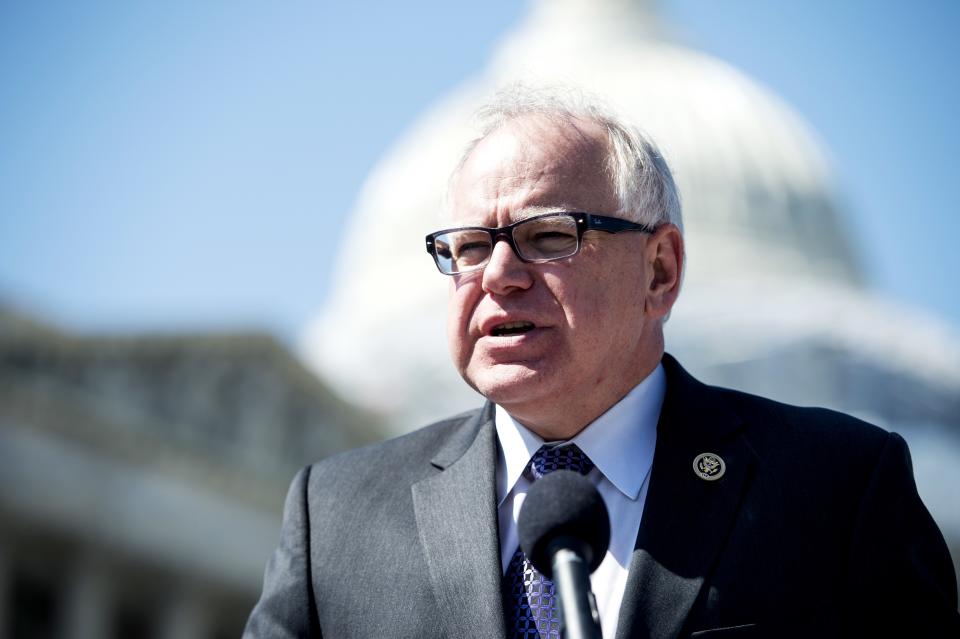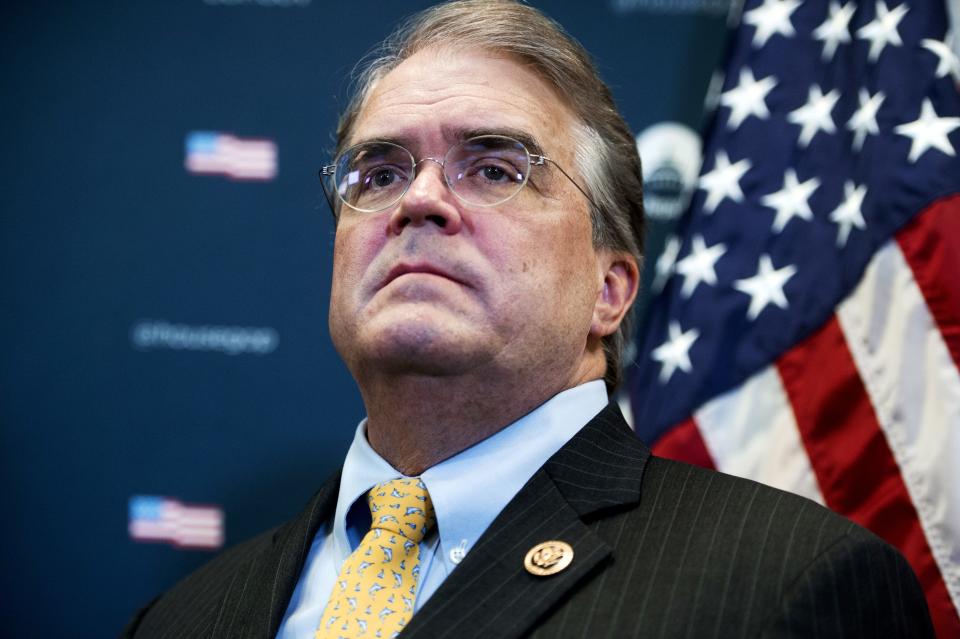How the Democrats Can Flip the House in the 2018 Midterm Elections, Part 7
Over the ten weeks between Labor Day and Election Day, as Democrats and Republicans battle it out for control of the House, we're taking a look at 30 of the most competitive races in the 2018 midterm elections: Where are these key districts, and what are they like? Which member is trying to keep their job? Who wants to take it away? And for whom might generous donations of your valuable time and money make the greatest difference, if you were so inclined to make them? Democrats need to win only 23 seats to earn the gavel for the next two years, and nothing terrifies Donald Trump and friends more than what they plan to do with it.
You can read earlier installments of this series at the end of this post, or a complete guide to the 2018 Senate races here.
California 48th: "Putin's favorite congressman" is on the ropes in Southern California

Rep. Dana Rohrabacher
Bill ClarkThe district: The pretty parts of Orange County: Newport Beach. Laguna Beach. Corona del Mar. 🎵 Cali-for-niaaaaaaaaaaa!! Here we commmmmeeee!!!! 🎵
The district's population is about 20 percent Hispanic and 18 percent Asian. As you may have gleaned from The O.C., it's very wealthy. (Average household income: $130,080.) Hillary Clinton beat Trump by 1.7 points.
The incumbent: Dana Rohrabacher, who has served for three decades now as the Russian government's most effective lobbyist in Washington not named Alexander Ovechkin or Elizabeth Jennings. (His friendship with Putin has long been the subject of alarmingly flippant jokes on Capitol Hill: "There’s two people I think Putin pays: Rohrabacher and Trump," House majority leader Kevin McCarthy said in a secretly recorded 2016 conversation with Paul Ryan. "Swear to God.")
Rohrabacher's greatest hits of late include happily shilling for Sacha Baron Cohen's insane KinderGuardians program, and not caring about sexual assault, as long as it occurred while the perpetrator was still in high school.
The challenger: Harley Rouda, a business executive and longtime Republican—he gave money to John Kasich in 2016—who says Trump's win was the end of his lengthy come-to-Jesus political journey. It was apparently an illuminating one; today, his website makes dollars-and-cents-based arguments for free tuition at public colleges and universities and touts Medicare for all as the "long-term solution" for this country's broken health-care system. He also looks at all times like a guy running ten minutes late for his tee time with Sandy Cohen.
Wait, he donated to John Kasich?: Yeah. He explained in a lengthy Facebook post (always a good start) that Kasich is a close friend and that he "wanted to stop Donald Trump and his divisive campaign." Otherwise, he says, "I supported Hillary Clinton," and says he's voted Democrat since 2004.
Even when viewed in the most charitable possible light, giving money to the campaign of a politician whose agenda you purport to oppose is, uh, dumb. In this longtime Republican stronghold, though, Rouda's history may appeal to moderate-conservative types who aren't ready to pin DSA roses on their lapels, but also aren't thrilled that their current member of Congress shows up in Mueller investigation plea documents with notable frequency.
Minnesota 1st: Bloggers make bad politicians

Rep. Tim Walz
Bill ClarkThe district: The state's southern border with Iowa. It's mostly farmland. The Mayo Clinic is here. It went for Obama twice, by narrow margins, and then for Trump by 15 points.
The incumbent: Tim Walz, first elected to Congress in 2006, is leaving office to run for governor as the Democratic-Farmer-Labor Party nominee. Given that he squeaked out his re-election bid in 2016 by less than one point, this seems like a prudent choice.
The contenders: The Democrat is Dan Feehan, a 36-year-old Army combat veteran and Obama-era Pentagon official who recently moved home to the district in which he grew up. His Republican challenger is Jim Hagedorn, the son of former Minnesota congressman Tom Hagedorn, who is running for this seat for a fourth time: He was defeated in a primary bid in 2010, and won the GOP nomination but lost in the general election to Walz in 2014 and again in 2016. He is the Dino Rossi of Minnesota, but with worse takes preserved in digital amber on the Internet.
How is Jim Hagedorn so bad at this?: Easy—because before entering politics, Hagedorn was a U.S. Treasury Department official by day and a goddamn lunatic right-wing blogger by night. Some of his more charming missives include labeling Barack Obama's campaign as a "low-budget remake of Eddie Murphy's hit comedy Coming to America"; referring to Democratic senators Maria Cantwell and Patty Murray as "undeserving bimbos in tennis shoes"; and calling Lawrence v. Texas, the 2003 Supreme Court opinion that prohibited the criminalization of same-sex consensual sexual activity, an "abomination on par with the deviancy it attempted to condone." A representative excerpt from his incisive analysis of the 2008 presidential race:

This illustrious past prompted The Washington Examiner to deem this sad-ass retread "the worst Republican candidate in America," which in turn prompted Dana Rohrabacher to breathe a deep sigh of relief.
Texas 7th:

House GOP
Tom WilliamsThe district: Parts of Houston and its western suburbs. This is the district George W. Bush represented when he was in Congress, and it's been held by Republicans since 1966. It's about 30 percent Hispanic and 14 percent black. Mitt Romney won by more than 21 points in 2012, but Hillary Clinton won by 1.4 points in 2016.
The incumbent: John Culberson, a climate-science denier who recently explained his use of campaign funds to buy dinosaur fossils by revealing that he is conducting research into "paleo-climatology." He's also the one who compared Republican efforts to delay the implementation of the Affordable Care Act to the heroic United Airlines Flight 93 passengers who thwarted their September 11 hijackers. ("The whole room said, 'Let’s vote!' I said, like 9/11, 'Let’s roll!'")
The challenger: 43-year-old Lizzie Fletcher, who has a political origin story that will warm your cold, black, Trump-weary heart. From The Texas Tribune:
In the early spring of last year, Houston attorney Lizzie Pannill Fletcher attended a town hall hosted by her congressman, Republican John Culberson.
As he responded to constituents' questions about his views on health care, gun regulation, immigration and net neutrality, Fletcher didn’t like what she heard.
“I shook his hand, and had a pleasant and brief exchange,” she said.
And then she decided to run against him.
She won a contentious Democratic primary thanks in part to some dubious meddling from the DCCC, which, convinced that Fletcher had the best shot of beating Culberson in the general, released opposition research on Fletcher's chief rival. Since securing the nomination, Fletcher has out-fundraised Culberson and has gone hard after his legacy of opposing Obamacare—a hot-button issue in the district.
All politics is local: Culberson is a senior member of the House Appropriations Committee, which, he says, enabled him to expedite the approval of federal relief funds in the aftermath of Hurricane Harvey. His problem, though, is that those funds still haven't arrived in the district—and while Fletcher has been a "conspicuous volunteer presence" since the storm took place, according to The Atlantic, Culberson has basically been a ghost.
“Most of my work is done quietly behind the scenes as an appropriator,” Culberson offered by way of explanation. “I’ve discovered there’s no limit to what you can do as long as you don’t mind who gets the credit.”
It’s a nice enough sentiment, but could prove damaging against a campaign centered on “showing up.” To be sure, federal dollars help a community heal, but face time does as well.
When I asked a longtime Republican insider—who requested anonymity to avoid backlash—why they were planning to vote for Fletcher, the source said: “We never saw Culberson after Harvey.”
In a tight race, in a swing district, in a year in which his party is expected to struggle, Culberson's absentee status could be what finally does him in.
Previously in "A House-Flipper's Guide to the 2018 Midterm Elections":
Part 1: Illinois 6th, California 10th, Maine 2nd
Part 2: New York 19th, Kansas 2nd, California 25th
Part 3: Kentucky 6th, California 39th, Ohio 1st
Part 4: Iowa 1st, Virginia 7th, Washington 8th
Part 5: Colorado 6th, Michigan 8th, Kansas 3rd
Part 6: New Jersey 3rd, Texas 32nd, New York 22nd


